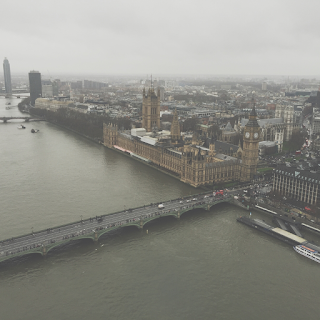Sonnet Composed Upon Westminster Bridge, September 3, 1802
Earth has not anything to show more fair:
Dull would he be of soul who could pass by
A sight so touching in its majesty:
This City now doth, like a garment, wear
The beauty of the morning; silent, bare,
Ships, towers, domes, theatres, and temples lie
Open unto the fields, and to the sky;
All bright and glittering in the smokeless air.
Never did sun more beautifully steep
In his first splendour, valley, rock, or hill;
Ne'er saw I, never felt, a calm so deep!
The river glideth at his own sweet will:
Dear God! the very houses seem asleep;
And all that mighty heart is lying still!
~ William Wordsworth - 1770-1850
NOTE: This poem is in the public domain.
Consider the following questions as you read the poem:
- What is the speaker looking at?
- Where is he making his observation from?
- What time of day is it?
- What effect does the view have on the speaker?
- Does the poem use specific literary devices to convey meaning? How so?
- What is the poem's tone?
- What themes are explored in the poem?
- What is the form of the poem?
It is early morning and the speaker is looking at the city of London. He is completely amazed by how beautiful the city looks and is convinced that Earth has no natural scenes that can match the beauty of the city as it appears in the morning's sun. Such a striking scene it is that he believes that only a dull soul would pass by this scene without being touched by its majestic beauty. The city is adorned by the morning’s beauty - like a dress - and ships, domes, theatres and temples lie open to the sky and field. They are bright and glittering in the sun because there is no smoke to hide them.
The speaker maintains that the sun has never shone so beautifully over any valley, hill or rock. Also, the tranquility of the morning is something he has never seen or felt before. He observes that since there is no industrial activity, the river can flow naturally - ‘at his own sweet will’. Generally there is a stillness over the city as houses seem asleep and the city ‘that mighty heart’ is silent. Typically, London would be bustling with industrial activity - factories would be emitting smoke, streets would be filled with vendors and pedestrians and ships would be busy making their way up and down the River Thames. However, at that time of day, the city of London is free from all that and is able to showcase all the beauty that is usually suppressed by industrialization.
Poem’s Form: sonnet (English)
Tone: It is clear that the speaker has a tone of admiration as he views the magnificent scene before him. Other words that can be used are: captivated, impressed or fascinated.
Themes: industrialization, the natural environment and human developments
Literary devices
- Simile: ‘This City now doth, like a garment, wear/The beauty of the morning’
- Personification: 1. The river glideth at his own sweet will. 2. Dear God! The very houses seem asleep.
- Imagery: Visual imagery dominates the poem. Examples: 1.‘All bright and glittering in the smokeless air’ 2. The river glideth at his own sweet will. 3. Ships, towers, domes, theatres, and temples lie/ Open unto the fields, and to the sky'
- Repetition: 'Ne'er saw I, never felt, a calm so deep!' The word ‘never’ is repeated to emphasize the novelty of the scene and the tranquility he sees and feels.
- Metaphor - 'Never did sun more beautifully steep...'
- Diction: The word choice in the poem helps to convey the writer’s admiration for the beauty of the city in the early morning. Note words like: majesty, touching, calm, bright, glittering etc
As you reflect on the use of literary devices in the poem, remember to pay keen attention to how they are used to communicate the effect the scene has on him. You should be able to comment on their effectiveness in achieving the writer’s purpose for writing the poem.
NOTE: This poem is often paired with ‘God’s Grandeur’ for the comparative essay.
Study Hub for CXC English A & B
Follow us on Facebook and Instagram.




the speaker looking at the nuture
ReplyDelete